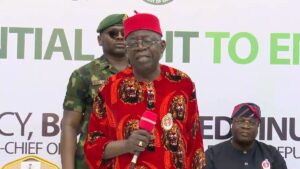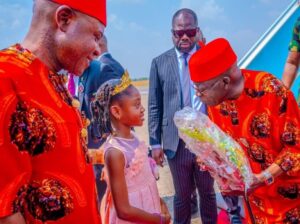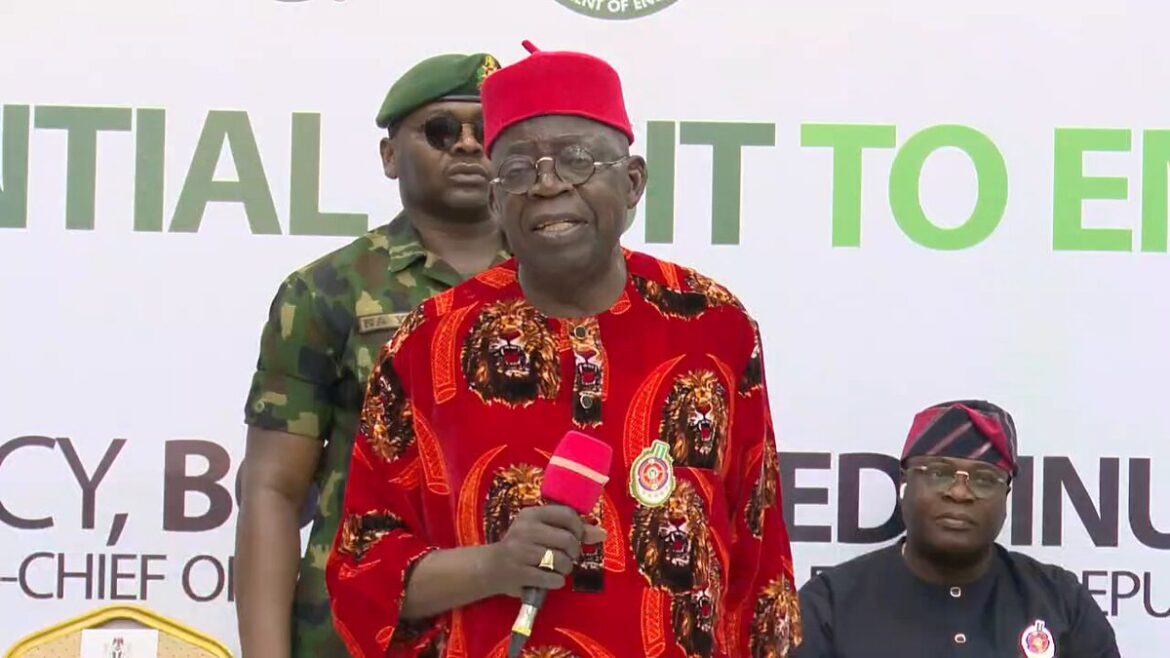
President Bola Tinubu has reiterated his commitment to the completion of the Eastern Rail Line connecting Port Harcourt to Maiduguri. This promise was made during his visit to Enugu, where he met with leaders from the Southeast region. Tinubu’s assurance about this vital infrastructure project reflects his administration’s focus on fostering national connectivity and economic development.
In his address, President Tinubu also emphasized the importance of developing the Anambra Basin as a significant energy reserve. This basin holds the potential for up to 1 billion barrels of oil and 30 billion cubic feet of gas, which could play a critical role in Nigeria’s energy and industrial sectors. The President pledged to support the full exploration and utilization of these resources.
The President listened carefully to the concerns of regional leaders, including former Minister of Power, Professor Chinedu Nebo, and Chris Ugoh, an Enugu State indigene. Nebo highlighted the economic benefits of completing the rail line and urged the government to prioritize its remaining sections. Ugoh, on the other hand, emphasized the potential of the Anambra Basin for power generation and industrial use, calling on the federal government to develop these resources for the benefit of the region.
On security issues, Onyemauche Nnamani, National Commissioner for the Southeast in the Police Service Commission, proposed modern security strategies for the region. He recommended the use of state-of-the-art surveillance technologies, such as CCTV systems and patrol vehicles equipped with cameras, to improve security. Nnamani also suggested reducing the use of roadblocks and checkpoints, which he described as ineffective and dangerous for security personnel.
Responding to these concerns, President Tinubu assured the leaders that his administration was dedicated to resolving the region’s challenges. He acknowledged the need for more investment in gas infrastructure and reaffirmed his administration’s readiness to work closely with regional governments to achieve these goals. Tinubu also recognized the contributions of local leaders, including former Senate President Ken Nnamani, who helped preserve Nigeria’s democracy during the Third Term crisis.
During his visit, President Tinubu inaugurated several projects in Enugu, including the GTC Smart Green School, the New Haven/Bisalla Road, and the International Conference Center. He praised Governor Peter Mbah for his vision and efforts in transforming the state, emphasizing the importance of public-private partnerships in fostering development. Tinubu also lauded Mbah for his commitment to technological advancements in Enugu, particularly through the Command-and-Control Center and other security innovations.
The President expressed confidence in the state’s development trajectory, noting that investments in security and infrastructure were crucial for rapid growth. He commended Governor Mbah’s leadership, which has focused on both physical and digital infrastructure, stating that such investments are essential for Enugu’s progress and for positioning it as a leading state in Nigeria.
In the interactive session, Governor Mbah described President Tinubu as a true federalist. He commended the President for initiatives such as the establishment of the Southeast Development Commission and the liberalization of the electricity sector through the Electricity Act (Amendment). Mbah also acknowledged Tinubu’s efforts in revitalizing Nigeria’s economic resilience, noting the significant progress that has been made under his leadership.
Governor Mbah also shared his ambitious vision to grow Enugu’s economy from $4.4 billion to $30 billion within four years. He emphasized that this goal could only be achieved with consistent security, quality education, and access to affordable healthcare. The Governor also highlighted his administration’s success in restoring law and order, notably ending the illegal sit-at-home orders imposed by criminal groups in the region.
The Governor’s plans for the state include the development of 260 modern Smart Green Schools and the upgrade of all primary healthcare centers across the state to ensure that even remote areas benefit from quality services. Mbah attributed much of the state’s progress to the federal government’s policies, including the removal of the fuel subsidy and the unification of the foreign exchange market, which have created a more conducive environment for growth.
In his closing remarks, Governor Mbah expressed his gratitude to President Tinubu for the bold measures his administration has taken to free up funds for development. He acknowledged that the federal government’s support in these areas has enabled Enugu to complete key infrastructure projects, including both physical and digital initiatives. Mbah concluded by reiterating his commitment to transforming Enugu into one of Nigeria’s top economic powerhouses.


